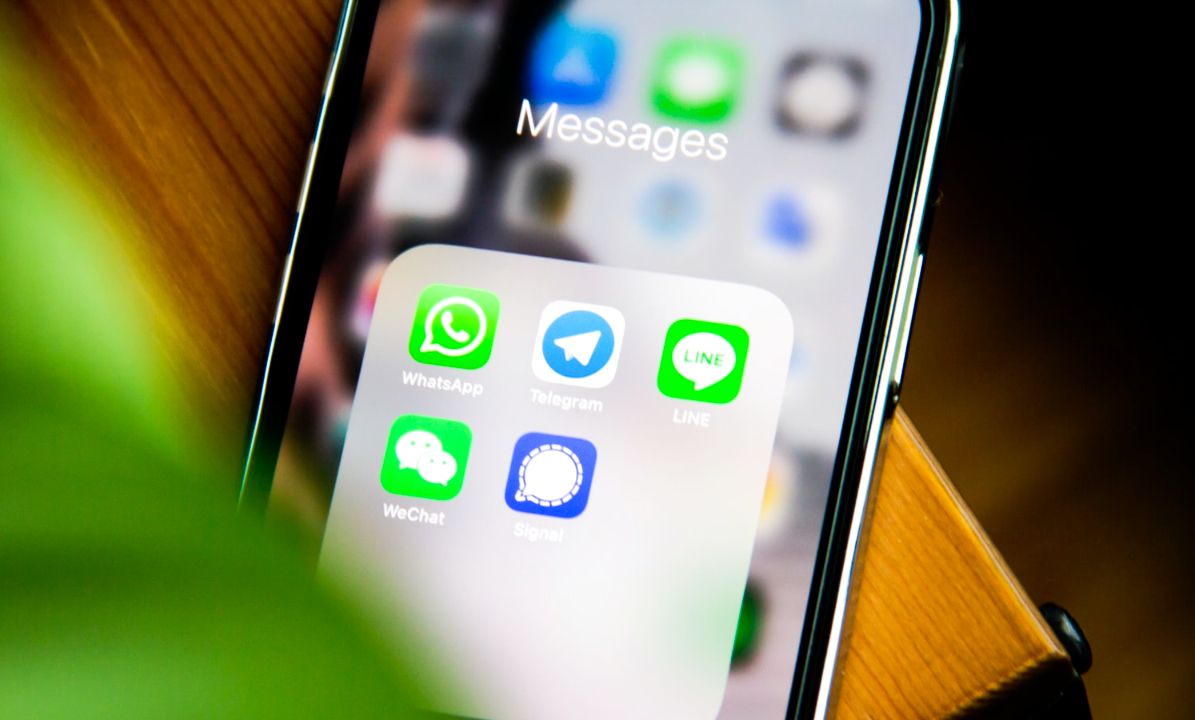

WhatsApp is still treading water amidst its privacy problems as it ratchets up its updates to keep hold of a wave of users leaving, and placate concerns around its data-sharing practices.
If you've already made your mind up, decamped, and are now in that desolate no-mans-land of a shiny device from our best Android phones or best iPhone list, but no trustworthy app to stay in touch – fear thou shall not, T3 will guide the way.
- Google Maps in new updates to make fixing missing roads a breeze
- Sonos is coming for the UE BOOM 2 with new Sonos speaker in March
- Samsung Galaxy S21 Ultra's major flaw will break the bank as well as your phone
WhatsApp has recently fallen to an E-Rating on Tos;DR. Tos;DR distils long Terms of Service conditions into bitesize privacy takeaways; its new rating reflects critics’ views that the messaging platform is compromising users' privacy, and is regarded as the gold standard for measuring discreet changes to privacy policies across the internet.
But, what options do privacy conscious users have through apps? We’ve handpicked the best WhatsApp alternatives that balance usability, while reinforcing data privacy.
Signal
Signal's name is rightly lauded across the internet for privacy. Despite it being more well known, it's still a great WhatsApp alternative. It retains substantially less metadata than rivals, it's available on multiple platforms, and it has a heritage of being security reviewed, as it's one of the more popular security apps.
One of the main criticisms of Signal, though, is that its support page is CloudFlared. In essence, this means that ultra-security aware users are impeded by a private walled-garden that blocks Tor. Tor, of course, is another level of anonymity that is often used in conjunction with encrypted apps for another layer of cloaking.
However, this may not worry everyday users who don't require this level of concealment. You can opt in to the Signal ecosystem by clicking through to here, and following the steps.
Sign up to the T3 newsletter for smarter living straight to your inbox
Get all the latest news, reviews, deals and buying guides on gorgeous tech, home and active products from the T3 experts
Telegram
Telegram was particularly popular a number of years ago: chat without cost, and security without profit. These all underscored Telegram's commitment to user privacy.
Of course, times change and there are better options available. If you're in the market for a user-friendly platform, though, we suggest signing up to Telegram here. Telegram even lets you move chats from WhatsApp: here's how to do it.
The interface is easy to navigate, and it still has a substantial user-base with more pronounced security benefits than regular messengers, including end-to-end encryption, and the ability to use the app as a more conventional messaging platforms – i.e. sending files and broadcasting to multiple contacts.
Wickr
Secure messaging services really started to up the ante in the privacy game with the advent of Wickr.
Reportedly, Wickr still doesn't log active IP addresses or Unique Device IDs; furthermore, it heralded a new era of 'burn-on-read' types messages, which let you set the timer for when the messages would expire. This is still a core component of its offering: sign up here to enjoy secure video conferencing and file sharing.
Like Telegram, it has more recently fallen out of favour with the head honchos in privacy groups that analyse these apps, but is still a good solution to those in need of extra privacy layers. It also doesn't log that pesky metadata that leeches onto your data trails.
Threema
Threema is one of the best privacy focused messaging apps in the field. The main advantage of this app is that you can register anonymously, here. As such, it isn’t tied to personal info (unlike your phone number linked to Signal). You can sync your address book and enable a stranger to contact you without revealing your mobile. It's a simple but major element of mobile privacy that is missing in many apps.
It can be used on devices without a SIM-card, even without the existence of a mobile phone number. The encrypted messenger landscape is ever-changing, but using Threema with android is a great option as permissions are decentralised; indeed, they work on a modular basis, so you can install it without enabling camera access, or microphone. We've got you covered at T3 with our ensemble list of the best android phones, that'll help you pick the best hardware to house your security software.
Threema Web even lands a ToS:DR B-Rating, which is reassuring when glazing over T&Cs. It's currently available on all platforms, upping its cross-functionality when switching between devices.
Wire
Wire is a lesser known, but strong contender for the privacy crown. Wire is 100% open source, which means the app is under constant auditing within the community. It has an easy sign up process, which can be found here, and is a very capable encrypted messenger.
Similar to Threema, Wire does not require a smartphone or a phone number, which is crucial to app privacy. End-to-end (E2E) encryption, self-destructing messages, and the implementation of strong encryption algorithms – such as the Proteus Protocol – underscores its privacy elements.
It offers apps for all platforms, which means it's a serviceable privacy solution for multiple devices. If you're in the market for a handset to facilitate your privacy journey, you can separate the wheat from the chaff with our best smartphones guide to guarantee the best device to house your security apps.
Silence
Silence (previously SMSSecure) does without the bells and whistles of other WhatsApp encrypted alternatives to give you a core privacy app that is focused on SMS and MMS. Yes, that's right, trusted SMS is the backbone of this platform.
The difference being that Silence's innards are an encryption powerhouse: an interesting option that wraps your SMS in encryption before sending it out, but often ignored by developers focusing on more versatile internet platforms.
In the early days of 2015, Signal even offered encrypted SMS messages as a conduit for its encrypted communications before dropping it to focus on internet messaging. Maybe a return to the stripped-back, no-frills basics of SMS with encryption to boot is an alternative to all the internet-based privacy frustrations that are dominating the news at the moment.
Element
Element is one of the most interesting WhatsApp alternatives. It's more severely concerned with the nuances of private communications. The first point is that it's open-source and decentralized; collaborative communication platforms are oft-cited as a more secure option, as the implicit implication is that an app has nothing to hide if it lets the community vet its code.
Apart from this, it also lets you self-host - or select the host - so that you have comprehensive control of ownership, privacy, and what happens to your data and conversations. It's a really good choice for those who want to take their privacy far beyond what adjacent platforms are offering.
Delta Chat
Again, another one for people very serious about revamping their privacy setup. Delta Chat lets users communicate with people who don't have Delta Chat installed on their phone; as such, you can message existing email addresses without the receiver needing a similar setup.
This solves one of the biggest complaints around users trying to get their families, friends, and colleagues onto an app without the mass adoption of WhatsApp. With Delta Chat, you're off-grid but with the scope to reach a vast majority of users, and independent of other companies and services, as your data is not connected to the app.
WhatsApp has rolled out its privacy changes unceremoniously, so it’s important to look at how the changes impact locality. Users outside of the EU cannot back out of the new data exchange, as GDPR does not offer protections. WhatsApp's Director of Policy, Niamh Sweeney, has said that European countries will be compelled to accept the changes, but without having to share data, including post-Brexit UK.
The truth is that apps can only offer so much in the way of privacy; it appears that the veneer of privacy in some, including WhatsApp, is being quickly deconstructed by relationships with bigger parent companies that crunch data, as part of its model.
These awkward relationships are then no longer viable; other apps, such as Threema, and Wire, are the current sweethearts of the privacy community. However, there is no telling in where the broader adoption of these services will leave the apps: many times between a rock and a hard place, as a company grows and its privacy commitments come under strain.
For now, we recommend Threema, and Wire as solid alternatives, alongside Signal. This privacy whitepaper sheds more light on Wire's metadata footprint, if you want to dig in further. Mainly, though, your privacy efforts can be bolstered by good personal operational security (OpSec), and a general awareness of policy changes through services like ToS;DR.
Source: Secure Messaging Apps
Luke is a former news writer at T3 who covered all things tech at T3. Disc golf enthusiast, keen jogger, and fond of all things outdoors (when not indoors messing around with gadgets), Luke wrote about a wide-array of subjects for T3.com, including Android Auto, WhatsApp, Sky, Virgin Media, Amazon Kindle, Windows 11, Chromebooks, iPhones and much more, too.
-
 I love Nintendo for bringing back kooky gaming cameras for the Switch 2
I love Nintendo for bringing back kooky gaming cameras for the Switch 2The Nintendo Switch 2 Camera is mad
By Max Freeman-Mills Published
-
 I tried Sony's new Sonos Arc rival – the Bravia Theatre Bar 6 goes big on bass
I tried Sony's new Sonos Arc rival – the Bravia Theatre Bar 6 goes big on bassSony's Bravia Theatre Bar 6 replaces the G700 soundbar system – and I got to test it out at a private listening session
By Mike Lowe Published
